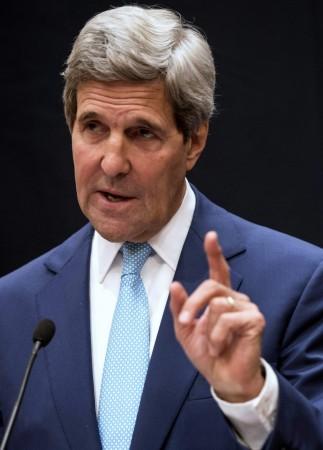
The US Secretary of State John Kerry has arrived in the Iraqi capital, as the aggressive Sunni militants, ISIS, remain relentless in their capture of towns and cities.
The Obama administration has already sent around 300 military advisers to try and help the weakening Iraqi army and stop the ever growing aggression of the Islamic State of Iraq and Syria militants, who are poised to create a caliphate over an area including major swathe of northern Iraq and Syria.
Speaking at a conference in Egypt on Sunday, Kerry warned that the Sunni militants' "ideology of violence and repression is a treat not only to Iraq but to the entire region". The comment came as the rebels captured border crossings to Syria and Jordan after having captured major towns and cities across the northern Iraq with last three weeks.
The strategically important airport in the northern Tal Afar, which controls the main road from the Syrian border to Mosul, has also been seized by the jihadists, who even launched a Twitter campaign last week justifying the bloodshed and violence.
Reacting cautiously to the ongoing crisis, the reluctant United States has avoided being fully drawn into the civil war, instead saying that air power could be used sparingly.
US President Barack Obama said last Friday that he was ready to use airstrikes in what he called, "targeted and precise military action" against the rising ISIS militants, adding that he was sending elite US special operations force of around 300 members to Baghdad in order to help the Iraqi forces who have almost been crushed in the hands of the belligerent insurgents.
"We always have to guard against mission creep, so let me repeat what I have said before, American combat troops are not going to be fighting in Iraq again," he said.
BBC cited officials saying that the break-away al-Qaeda group took two key crossing in the bordering town of Anbar on Sunday, after seizing another one at Qaim.
Speaking in Cairo, Kerry urged Iraq's leaders "to rise above sectarian motivations and form a government that is united in its determination to meet the needs and speak to the demands of their people".
Washington has been subtly hinting that the ongoing crisis was partly due to Iraq's Shiite prime minister, Nuri al-Maliki's failure to quell the advancing insurgents, although the United States has refused to be blatant on this subject.
While the worry of Iraqi government has been simple – the fact that the rising power of ISIS will leave the country deeply fractured and wounded -- the western giant that has been silent ever since it withdrew its forces from Iraq in 2006, has suddenly been forced to spring into action as it sees the rise of a new terrorist group that could possibly launch another 9/11-style attack in near future.

















